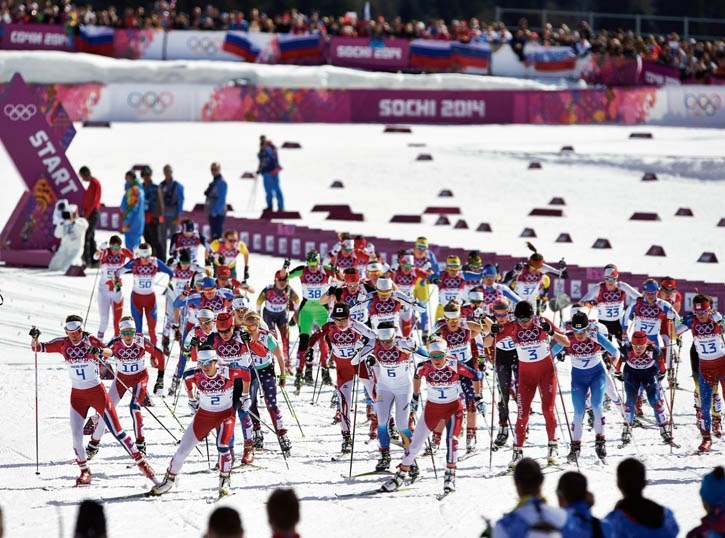When the giant crying bear puppet blew out the Olympic flame to conclude the 2014 Winter Olympic closing ceremonies in Sochi, it ended one of the most memorable spells in Canadian sport history. Canada finished fourth in the medal count and 19 Bow Valley athletes forged memories they won’t soon forget. Banff’s Jan Hudec was the only athlete to win a medal, while biathlon and cross-country ski athletes had a litany of highs and lows.
High performance director Chris Lindsay said Biathlon Canada’s goal was to win one medal at the 2014 games. The goal was ambitious, however Canada’s team has shown marked improvement on the world cup circuit leading up to 2014. In Sochi, their best result was a fifth place finish by J.P. LeGuellec (who will retire after Canadian National Championships) in the sprint, and they did hit their performance peak at exactly the right time.
“I believe we had seven new Olympic records in eleven races. We had J.P. LeGuellec, Brendan Green and Nathan Smith in the top 11. Three men qualified for the pursuit – something we have never achieved, even on the world cup. We had Zina Kocher ski as fast as the fastest women in the world. Both our relays were in contention for medals. Our skis were the fastest in the world. Our coaches achieved performance peaks exactly when we needed it,” Lindsay said.
The biathlon team had several near misses. LeGuellec was leading the men’s pursuit at the halfway mark when he fell and broke his ski, dropping him back to 26th spot, and he had a terrible time in the range in the men’s relay. Kocher moved the women’s relay team into second spot with three kilometres to go, but faltered on her last shooting bout.
“We absolutely wanted to put one on the board for Canada and despite all our success the absence of a medal is a hard reality. Our team, more than many others, acted as a single supportive unit. We gained strength through our shared experience. Through the highs and lows, we stayed unified,” Lindsay said.
Things weren’t as rosy in the cross-country ski camp, which left The Games without a top-10 finish, let alone a medal.
Cross Country Canada head coach Justin Wadsworth made an impression at the games thanks to his kindness toward a Russian skier in the sprints. Anton Gafarov was struggling to finish his sprint leg with a broken ski, falling down steep hills in rag-doll fashion when Wadsworth showed up with an extra ski, allowing Gafarov to finish with dignity. While the incident earned him praise, he would have rather had his athletes in the headlines.
“My disappointment stems from years of being ready for this day and then having nothing,” Wadsworth said after the sprints. “It has been a hard Olympics for all of us for sure, and particularly Devon (Kershaw) with having a head cold. We have to give this some time and try and learn from it.”
Wadsworth said his team wanted to win two medals at The Games, but fell quite short. Several of their athletes got sick, poor wax quashed at least three races and others didn’t perform up to their own lofty standards.
Since Own the Podium funding is tied directly to medals, the performance doesn’t bode well for Biathlon Canada or Cross Country Canada. Cross Country Canada received $4.9 million from Own the Podium over the past four years, including $1.3 million for the 2013-14 season. In contrast, Biathlon Canada had an enormous budget cut, as they’ve watched their annual Own The Podium contribution dwindle from $431,00 in 2010-11 to $200,000 in 2012-13. Over the quadrennial, OTP has contributed $1.1 million to Biathlon Canada and as a result, each National team member had to pay $6,000 just to be on Team Canada. Only Nordic Combined and Ski Jumping received less OTP funding than biathlon.
Freestyle skiing, by far Canada’s strongest team at the Games, received $10.3 million over the past four years, followed by Snowboard Canada ($8.6 million), Alpine Skiing ($7.1 million) and Long Track Speed Skating ($6.9 million). In total, OTP spent $80 million on 17 sports over the past four years. Teams must fundraise and seek corporate sponsorship in order to increase their budget.




